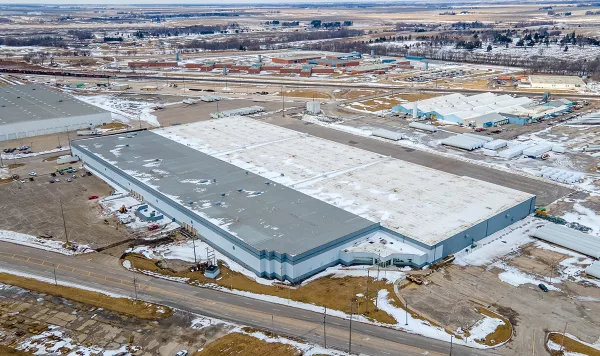
A company that specializes in the production and distribution of crafted meat snacks plans a nearly $50 million expansion project in Galesburg, a move that’s expected to create between 150 and 180 manufacturing jobs and breathe new life into the unused portion of the former Maytag facility.
Aldermen at the Oct. 7 meeting of the Galesburg City Council will consider a $1 million development agreement with Thrushwood Farms Quality Meats, Inc., a subsidiary of Western Smokehouse Partners. The economic support from the city would facilitate the viability of the project moving forward in the community.
Western Smokehouse Partners has executed a 10-year lease for 179,000 square feet of the former Maytag facility on Monmouth Boulevard. The move will allow for expansion of food production operations and initially create 150 – 180 new manufacturing jobs and generate $45 – $50 million in investment.
“This is a tremendous opportunity for the City of Galesburg to aid in the development of a locally founded business and foster their continued growth within our community,” City Manager Eric Hanson said in a news release.
“Significant long-term investment in jobs and facilities within our community, such as this, serve as economic drivers, benefitting the community as a whole through increased economic investment and prosperity.”
Thrushwood Farms was founded in Galesburg in 1978 as a local meat processing plant. The operation has grown and adapted over time, including cultivating a specialization in snack stick production.
In 2020, Thrushwood Farms became part of Western Smokehouse Partners, and the companies have continued to grow together since that time, including recently executing a 10-year lease to locate the Western Smokehouse Partners headquarters at 56 S. Kellogg St. in Galesburg.
As part of that project, Western Smokehouse Partners entered into a development agreement with the City of Galesburg in May of 2024, in which the City provided $300,000 to aid in the local expansion that included a 10-year lease for their headquarters in Galesburg, retaining seven headquarter jobs with a minimum payroll of $500,000, creating 10 headquarters jobs with a minimum payroll of $1 million, and creating 15 manufacturing jobs with a minimum payroll of $675,000.
The previously announced expansion project creates 32 local jobs with a total positive economic impact of $2,175,000.
Western Smokehouse will employ 350 in Galesburg after expansion
“We believe in the potential of this community and are excited to create new jobs that will provide stability and prosperity for local families,” said Matt Bormann, chief executive officer, Western Smokehouse Partners. “This project will not only increase our production capacity but also strengthen our ties to the community, fostering a collaborative environment.”
According to the city news release, Hanson has recommended approval of the development agreement, which coincides with the new administration’s prioritization of long-term planning, and purposeful initiatives for revitalization of the city through business expansion and job creation.
“We are proud to expand our operations again in Galesburg,” said Doug Hankes, Chief Product Officer, Western Smokehouse Partners. “Thrushwood Farms began as a small family start-up in Galesburg, and we are exceptionally pleased to see the company continue to grow within our community.”
After this most recent expansion, Western Smokehouse Partner will employ over 350 total employees in Galesburg, making the organization one of the largest employers in the community.
Economic development: Project will be ‘transformative for the region’
Ken Springer, president of Knox County Area Partnership for Economic Development, said in the news release, “This is an amazing project that will be transformative for the region. I can’t overstate how exciting it is to see a home-grown company in one of our region’s targeted growth industries undertake an expansion of this magnitude.
“This project reflects our community’s commitment to growing our skilled workforce and the attractive business environment that we are cultivating in Western Illinois.”
The Maytag plant — before that, Midwest Manufacturing, Admiral and Rockwell — closed in 2004.
In its news release, the city said, “To see the facility fully utilized once again, is not only symbolic for a community that has long felt the after-effects of the departure of its largest manufacturer, but also economically significant in the literal context of money invested in the revitalization of the property, and jobs created.”







